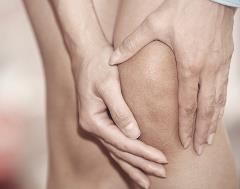Healthy Living: Orthopedics
Types of Pain and How to Get Relief

For many people, pain is part of their daily life. According to data from the National Health Interview Survey (2018), pain affects approximately 20% of adults in the U.S. and some 8% of those suffer with high-impact chronic pain that limits daily activities. To help shed some light on the most common types of pain and popular treatments to make it go away, here’s a quick primer.
Types of Pain
Acute pain is that which starts suddenly and typically lasts for a shorter amount of time while the body is healing. Examples of acute pain include: the pain associated with an injury, a broken bone, a kidney stone or a sudden toothache. Pain that lasts more than three months is considered chronic pain. Chronic pain is also characterized as persistent pain which can disrupt normal living and may lead to decreased health and functional ability.
Most Common Types of Pain
The most common types of acute pain include:
- Bone and joint-related pain (fractures, back pain, knee, hip, shoulder, neck and other musculoskeletal conditions)
- Gastrointestinal pain (stomach, digestive and abdominal conditions)
- Chest pain
- Headaches
The most common types of chronic pain:
- Back pain (especially low back pain)
- Neck pain
- Arthritis / joint pain
- Neuropathic pain (pain in nerves)
- Headaches
Treatments for Pain
Depending on the type and duration of pain, according to the National Institute of Health, pain treatments may vary and while all pain is not curable, most is treatable. Consult with your doctor about your specific condition(s) and his/her recommendation for effective relief.
Acetaminophen – This is the main ingredient in Tylenol® and generic versions sold over-the-counter, as well as in prescription strengths with codeine.
Acupuncture – This involves needles applied to precise pressure points on the patient’s body and is practiced in the category known as Chinese traditional medicine.
Electrical stimulation, such as transcutaneous electrical stimulation (TENS), where electrical pulses are delivered through the skin to nerve fibers that can block pain transmission at the spinal cord level. Specialized equipment and training are required for this type of treatment.
Ibuprofen – a member of the aspirin family of analgesics, a non-steroid anti-inflammatory and over-the-counter medicine that also comes in prescription strength.
Physical therapy and rehabilitation – includes physical methods such as heat, cold, exercise, massage and manipulation to increase function, control pain and help patients recover from surgery and injuries.
R.I.C.E. – Rest, Ice, Compression and Elevation are four components often prescribed by orthopedists and other professionals for temporary muscle or joint injuries, such as sprains or strains. Ice is often recommended to help reduce inflammation associated with acute injuries; heat or ice may help with inflammation and increased mobility. More serious conditions may require surgery or physical therapy.
Surgery – Depending on your doctor’s diagnosis, surgery may be required to repair an issue and relieve pain, especially pain caused by musculoskeletal injuries, bone fractures, joint and back problems. Treatments involving non-invasive procedures or robotic-assisted surgery may be available that have shorter recovery times.
If you suffer with pain that is impacting daily activities, consult your doctor. If you need to find a doctor or specialist in your area, complete the form on this page.
SOURCES:
https://nccih.nih.gov/research/results/spotlight/Prevalence-of-Chronic-Pain
https://www.nia.nih.gov/health/pain-you-can-get-help#acute
http://americanpainsociety.org/uploads/education/npc.pdf


